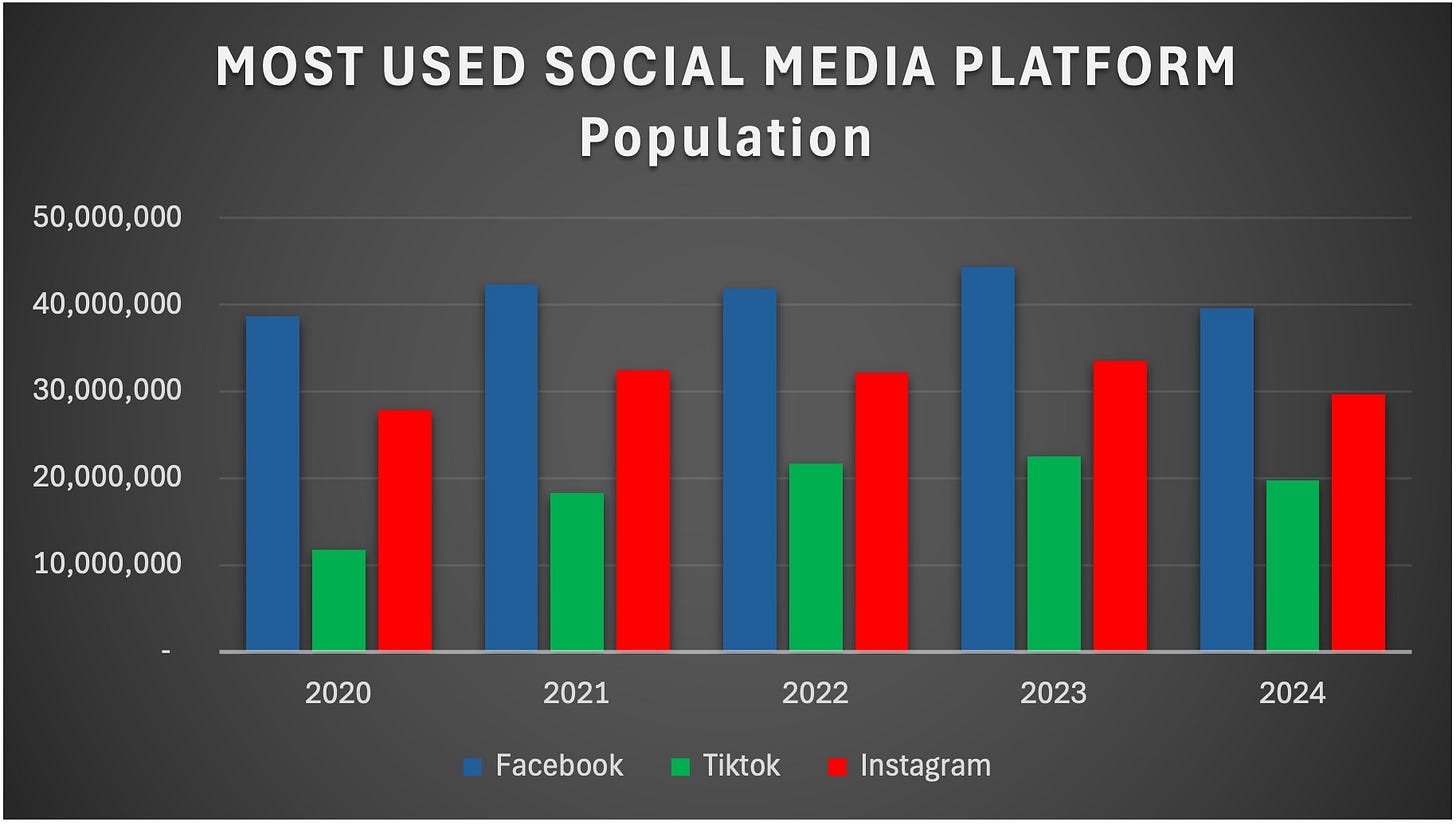TikTok’s UK Takeover: Unpacking the Data Behind Its Explosive Growth and Cultural Impact
TikTok’s UK user base soared 90% in three years
In just a few short years, TikTok has transformed from a niche video-sharing app into a global social media powerhouse. Since its rise began around 2020, the platform has seen explosive growth in the UK, with active users nearly doubling from 11.8 million in 2020 to over 22 million by 2023. This surge has positioned TikTok as one of the fastest-growing social networks, outpacing giants like Facebook and Instagram in user engagement and time spent. Globally, TikTok’s influence is even more pronounced, boasting over a billion monthly active users and reshaping how people create and consume digital content. This report delves into the data behind TikTok’s meteoric rise and explores the key factors fueling its unprecedented expansion.
TikTok’s meteoric rise: outpacing Facebook and Instagram
When it comes to speed of growth, TikTok has left its competitors in the dust. According to DataReportal, TikTok’s active user base in the UK soared from just over 11.8 million in 2020 to nearly 22.5 million by 2023 - a staggering 90% increase in only three years. Even with a slight dip to 19.7 million in 2024, the platform’s growth trajectory remains unmatched.
By contrast, Facebook, once the undisputed leader of the UK social media scene, saw its user base grow far more modestly. Facebook’s UK active users climbed from 38.7 million in 2020 to a peak of 44.4 million in 2023, an increase of about 15% over the same period. Instagram’s growth was similarly steady but unspectacular, rising from 27.8 million to 33.6 million users - an increase of roughly 21% between 2020 and 2023.
What’s even more striking is the engagement gap. In 2020, TikTok users already spent more time on the app each month (19.1 hours) than Facebook (16.1 hours) or Instagram (8 hours). By 2024, the average TikTok user was spending a remarkable 42 hours per month on the platform, nearly tripling their engagement in just four years. Facebook’s average monthly user time remained relatively flat, hovering around 15–16 hours, while Instagram’s numbers stayed below 10 hours.
These numbers paint a clear picture: TikTok hasn’t just grown faster than its rivals - it has redefined what rapid growth looks like in the UK’s social media landscape. Its ability to nearly double its user base in three years, while dramatically increasing user engagement, sets it apart from the more incremental progress of Facebook and Instagram.
Why has TikTok grown so rapidly? Key drivers behind its success
TikTok’s explosive growth is no accident. Several unique features and strategic advantages have propelled the platform ahead of established social media giants like Facebook and Instagram.
Beyond its many individual strengths, such as its engaging short-video format, powerful AI-driven personalisation, and easy-to-use creative tools, TikTok possesses a unique synergy that sets it apart from competitors like Instagram. This synergy isn’t just about offering a collection of features; it’s about how those features combine to create an ecosystem perfectly tailored for today’s digital natives.
Gen Z’s global embrace and community
According to DataReportal, TikTok’s core demographic skews younger, with around 50% of users under 30 worldwide. This youth appeal is crucial, as younger generations adopt new technologies faster and spend more time on social media. Moreover, TikTok’s global reach combined with localised content strategies allows it to resonate across diverse cultures and languages, making it a truly international phenomenon.
One of the key drivers behind TikTok’s rapid growth is its overwhelming popularity among Generation Z, the cohort born roughly between 1997 and 2012. Globally, about 60% of TikTok’s users belong to this generation. They not only consume but actively create content on the platform. Research shows that 82% of Gen Z social media users have TikTok profiles, making it their favourite social app worldwide (Sprout Social, 2025). This generation’s affinity for TikTok goes beyond mere usage; they are drawn to the platform’s authentic, unfiltered content and its vibrant community culture that connects young people across countries and cultures (Planly, 2024).
82% of Gen Z social media users have TikTok profiles, making it their favourite social app worldwide
The shared values and digital behaviours of Gen Z appear to transcend borders, creating a global “community” where trends, challenges, and cultural expressions spread rapidly. Studies highlight that TikTok fosters a sense of belonging and inclusivity, which resonates deeply with Gen Z’s desire for connection and representation (ScienceDirect, 2025). This global pattern of engagement among Gen Z users helps explain why TikTok’s growth is not just a local phenomenon but a worldwide social media revolution.
The dopamine trap and the flattening of society - how TikTok and social media shape our minds
Reyhaneh Tabatabey, a journalist specialising in digital media, believes that social media platforms like TikTok have fundamentally changed the way people think and behave. She said the addictive nature of these platforms is rooted in their ability to provide users with constant dopamine hits, making it increasingly difficult for individuals - especially young people - to disconnect.
According to Tabatabey, TikTok’s endless stream of short, engaging videos keeps users glued to their screens. She added that this constant stimulation not only leads to addiction but also encourages users to imitate one another, resulting in a striking similarity in appearance, opinions, and even social or political stances among users worldwide.
She emphasised that the powerful algorithms behind TikTok and similar platforms are designed to channel users’ attention towards specific trends and viewpoints. She pointed out that this can lead to a narrowing of perspectives, as people are repeatedly exposed to the same types of content. “When everyone is seeing and reacting to the same things, it’s no surprise that critical thinking and pluralism begin to erode,” she said.
“The Facebook–Cambridge Analytica scandal opened the door for alternatives like TikTok to rapidly gain traction, especially among younger audiences seeking fresh and authentic digital spaces.”
She further noted that this phenomenon is evident in the way people respond to major social or political events. Tabatabey observed that public reactions often appear almost identical, with little room for dissent or alternative viewpoints. She warned that such homogenisation poses a threat to the diversity of thought and healthy debate that are essential for a vibrant society. In her view, the influence of platforms like TikTok goes far beyond entertainment.
Tabatabey also pointed out the lasting impact of the Facebook–Cambridge Analytica scandal on British social media users’ trust. She explained that the 2018 revelations about the misuse of millions of Facebook users’ data for political profiling deeply shook public confidence, particularly in the UK. “The scandal created a widespread scepticism towards Facebook and other established platforms, Tabatabey said, “which opened the door for alternatives like TikTok to rapidly gain traction, especially among younger audiences seeking fresh and authentic digital spaces.
She added that although TikTok faces its own scrutiny regarding data privacy, its rise coincided with a period when many users were questioning the dominance and ethics of older social networks. This context, she argued, helps explain TikTok’s pronounced growth in the UK compared to more established competitors.
Tabatabey concluded by stressing the importance of media literacy and critical thinking, urging both individuals and policymakers to be aware of the subtle but profound ways in which social media can shape public opinion and behaviour.
Conclusion
TikTok’s rapid rise in the UK social media landscape marks a significant shift in how people engage with digital content. The platform’s ability to nearly double its user base within a few years, coupled with a dramatic increase in user engagement, highlights its unique appeal - particularly among younger generations. As the data shows, TikTok has outpaced established giants like Facebook and Instagram not only in growth but also in the time users spend on the app.
This trend reflects broader changes in media consumption habits in the UK, where short-form, personalised content delivered through sophisticated algorithms resonates strongly with today’s digital natives. However, this transformation also raises important questions about the social and cultural impacts of such platforms, including concerns over content homogenisation and the effects on critical thinking.
As TikTok continues to evolve and shape the UK’s digital landscape, understanding its influence will be crucial for policymakers, educators, and users alike. The challenge ahead lies in harnessing the platform’s potential for creativity and connection while addressing the complexities it introduces to society.







